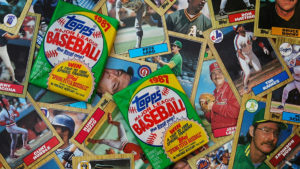Anyone who has been collecting cards for a long time might take this for granted, but there are a lot of terms, abbreviations, and slang that gets thrown around the hobby. It’s enough to make a new collector’s head spin as they try to piece together all this new information.
That’s why we thought it would be helpful to put together a quick glossary of some of the more prevalent lingo you might come across. If we can help even one person be a little less confused, we’ll have done our job.
Without further ado, onto the vocab lesson:
- AU — Short for “autograph.” You’ll mostly see “AU” in listings for cards; when spoken, they’ll be called “autos” or “autographs.”
- Base Card — These are the normal, everyday, (typically) not-noteworthy cards in a pack. The opposites of base cards are: Inserts, refractors, and patches/autographs.
- BMWT — An abbreviation for “bubble mailer with tracking.” It’s a higher-end way to ship a card to a buyer, as it provides extra protection and lets them know when it’s expected to arrive.
- Ding — A damaged corner. The condition of a card’s corners is one of the grading criteria that carries the most weight, so a ding can really hurt its score and value.
- Filler Break — When all the spots in a break aren’t sold, the breaker will often hold a raffle to fill the remaining spots. For example, if there’s one spot left and it costs $200 to enter, the breaker might hold a filler break where 10 people pay $25 for a chance at it. That way, someone ends up in the break for very cheap, and the breaker ultimately makes a little more than he would’ve selling the spot outright.
- Grade — Collectors will send potentially-valuable cards in to be professionally evaluated. Cards are graded based on their condition and assigned a score between 1 and 10. For more information, check out our guide to grading.
- Group Break — Opening packs and boxes on video (stream or recorded) where the audience has bought into some portion of the cards. The group is both watching the opening and owns the cards. For a deeper dive into group breaks, check out our FAQ.
- Hit — This quite literally just means “a good card.” Everyone has a different idea of what qualifies something as a hit. However, something like an autograph is pretty much universally considered to be a hit.
- Hobby Box — These are generally what more serious collectors are after. Hobby boxes can typically only be found in hobby stores (or bought direct from manufacturers) and contain more cards, more inserts, and better odds than retail packs. They’re also more expensive. (See also: Retail pack.)
- Inserts — These are subsets that are randomly inserted in packs along the base set. They’re different than the base cards and will typically have some sort of theme like a league’s statistical leaders from the previous season.
- Junk Wax — Cards from the ’80s and ’90s that were produced in astonishingly high quantities. There was so much supply that it virtually rendered almost every card worthless. Hence, it’s basically junk.
- Mixer — A group break where various products are opened rather than a single type of card. It’s quite literally just mixing things up.
- One-Touch — This is a type of hardcover case for protecting a card. It has a magnet seal, so it’s very easy to put the card in and close the case without risking damage to the corners. A one-touch usually runs a couple of dollars.
- PWE — An abbreviation for “plain white envelope.” This is the least protective way to ship a card, as it’s liable to be bent and/or damaged when being tossed around with all the other mail in the postal service.
- Raw — A card that hasn’t been sent in to be graded.
- RC — An abbreviation for “Rookie Card.” This one comes up often because most every rookie card has “RC” emblazoned across it somewhere.
- Redemption — This is a card that’s mailed into the manufacturer (or redeemed online) in exchange for a hit (which is usually an autographed card). Redemptions mainly exist because of logistical problems getting autographs back from athletes before the boxes are due to ship.
- Refractor — Also called a parallel, these are reflective cards that are rare variants of the base cards. Some colored refractors have relatively high print runs; others, like superfractors, might have only had one printed.
- Relic — This refers to any memorabilia that’s in a card. More often than not, it’s a piece of jersey.
- Retail Pack — The opposite of hobby boxes/packs. These are the packs that you’ll see at places like Walmart and Target. They’re cheaper but the odds of pulling something rare is lower. Retail is usually limited to manufacturers’ biggest sets; the boutique stuff is typically hobby-only.
- RPA — This is an abbreviation for “Rookie Patch Autograph.” It’s the holy grail of rookie cards.
- Short Print (SP) — A card (usually toward the end of a numbered set) that was printed in smaller quantities than the other cards. Short prints are often reserved for retired players or for image variations of a high-profile player’s card.
- Slabbed — Slang for a card that’s professionally graded. The term comes from the slab case that will display the card’s score.
- Sticker Auto — These are autographs that an athlete signed on a sticker, and then the sticker was applied to the card. On-card autos are much more desirable.
- Super Short Print (SSP) — The exact same as a short print but even more rare. If they’re numbered, they’re typically limited to very small quantities like 15 or 25 total.
- Team Break — A format of group breaking where buyers are assigned all the cards from a specific team. The price of entry typically increases based on the popularity of a team. However, some team breaks are randomized so that no one has control over the team they have.
- Toploader — A durable protective sleeve for a card. The name comes by way of the fact that you insert the card from the top of the sleeve.


Wow that is a lot of information very very helpful and I personally appreciate it thank you so much
I’m learning thank you for your help.
What’s a parallel?
Rounded corners on a card are called what?
What other terms are used to identify worthy cards in a pack or box?
@Felipe
A parallel is a subset of a card that usually has the same picture on the card but the border is a different color or the effects in the background of the card are altered but the picture and number on the card is the same for all of the different parallels.
Rounded corner = Soft corner